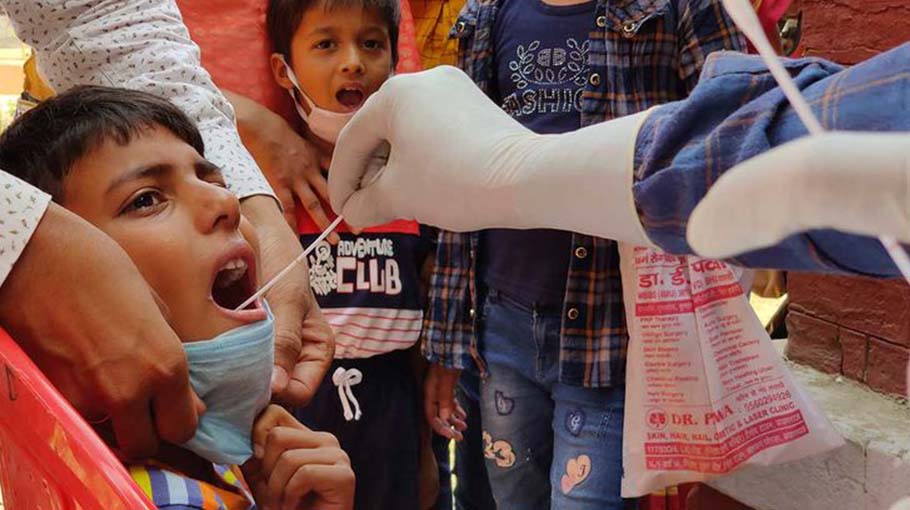Vaccinating the young: Has India left it too late?
There is still time for right messaging to encourage vaccination in both children, adults


Finally, 15-18 age group in India is lining up for COVID-19 vaccination and it is not a day too soon. Delhi Chief Minister Arvind Kejriwal who attended a political rally recently has tested positive, the unfathomable night curfews are back across some Indian states and there is no longer any doubt over the third wave.
In the midst, of this almost two years since the pandemic hit, a section of our younger population at long last gets the security blanket it deserves as the country stares and stares down at an Omicron surge.
The children — over 600,000 who have registered while almost 70 million are eligible — though can only get Bharat Biotech’s Covaxin while the government has staunchly refused to allow families the option of vaccines like Pfizer that are now globally vaccinating even those as young as 5 years. Until now, Covishield has been doing the heavy lifting in the country.
What could impact the vaccination drive is the scepticism over Covaxin which hasn’t been the choice for all, especially for their children. Their doubts were further magnified when some centres showed vaccines with expired dates that had been relabelled as safe.
Without an official notification, nervous parents are now scrambling to understand if the extended shelf life is worth the risk. They have reasons to be conflicted. For the last two years there has been no communication or answers, but the questions keep piling up.
Why has it taken so long to vaccinate our children? Why are children younger than 15 — almost 27% of India’s population — still not allowed, even though across the world the minimum age has been 12 and going lower? Why are citizens not being given the choice of vaccination, at least for their children? Why have schools been the first to close, down even though cinemas, bars and malls remain open?
It is not just high schoolers who need to get back to normality. Those younger than 15 are not dispensable, foundation years are crucial in a child’s development, and students across age groups are already academically behind. School closures and moving to online classes may have worked for a short period of time but motivating students in social isolation for a third year is underestimating the ever-widening gap in education.
Not just that, by denying the younger children a vaccine without disclosing any data we are also overlooking at the mental impact on them. In families where they are the lonely warriors without a jab, they hide fear and insecurity. These children are scared because while no one is talking about it, they hear and understand that without vaccination they are exposed.
Doubters and nay-sayers
No vaccination of course can save anyone from getting Omicron, but health experts are unanimous — it cuts down the risk of hospitalisation, something anti-vaxxers who these days are the new trolls on the block, conveniently overlook. They could also do well to remember that as children we are first introduced to an MMR or polio vaccine and then the world.
Vaccination will also allow the children a first shot at attending schools physically when the situation eases. The caveat of course is that authorities need to treat education as a priority.
The silence has not just allowed fake information on WhatsApp to flourish but also misinformation to flow. Science though has not been having a good couple of years.
The disregard for Omicron is peak Indian herd mentality. The narrative that ‘it is mild’ has thrown all caution to the wind. We have ascertained (through another WhatsApp forward) that Omicron is our best bet for herd immunity. Masks have been disdainfully thrown away and social distancing is taunting the variant, whether at political rallies (clearly our leaders prefer not to learn anything from the second wave) Goa beaches or a market in Delhi.
Omicron is highly transmissible — the sharply rising numbers are a proof and at this moment, we are all playing dodge ball. Anecdotal evidence coming from some cities also points to hospitalisation which could perhaps indicate that the more lethal Delta is also still in the mix. The new variant has spread to 23 states in the blink of an eye, and this is when testing is not even up to the mark.
Our scant respect for health care is unfortunate and no less than a back-stabbing. It was only months ago that our system was heaving to keep us afloat. We on the other hand have been obstinate in our belief that this is only about us — that our irresponsibility does not impact the person sitting next to us or burden an already strained health care.
The doctors have been the only ones cautioning — that this isn’t over yet and any increase in hospitalisation they say will have a domino effect. But more importantly, as the medical staff themselves begin to fall sick — more than 100 doctors have fallen sick in Kolkata alone in the last 24 hours, who will treat the patients? The fallout of the delay in giving them the boosters is evident.
As we sit complacent believing Omicron itself is the new herd immunity, jingoistic congratulatory messages on the vaccine records for children are inevitable.
Instead, there is still time for the right messaging — to encourage vaccination in both children and adults. Watching closely are children below the age of 15 who are hoping they won’t remain an afterthought.
Jyotsna Mohan is the author of the investigative book 'Stoned, Shamed, Depressed'. She was also a journalist with NDTV for 15 years.
Source: Gulf News



